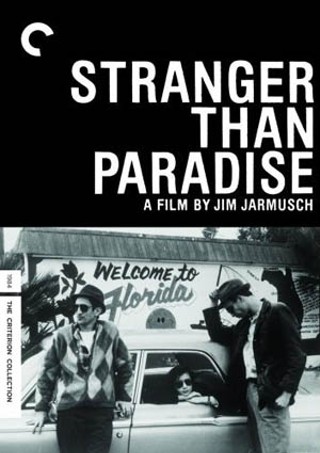Stranger Than Paradise
When it was first released in 1984, Jim Jarmusch's tale of three lost souls going nowhere was a revelation – a dry-as-the-desert revelation in black and white, or rather gray and lighter gray
Reviewed by Josh Rosenblatt, Fri., Sept. 28, 2007

Stranger Than Paradise
Criterion, $39.95When it was first released in 1984, Jim Jarmusch's tale of three lost souls going nowhere was a revelation – a dry-as-the-desert revelation in black and white, or rather gray and lighter gray. Along with John Sayles' Return of the Secaucus 7 and Spike Lee's She's Gotta Have It, Stranger Than Paradise helped create the great American indie-film scene of the Eighties, which would later explode into the mainstream with the arrival of Quentin Tarantino, Richard Linklater, and Kevin Smith and the ascension of Miramax in the early Nineties. As is the case with so many of Jarmusch's films, Stranger's story is less significant than its overall aesthetic and its oddball cast of misfits and outcasts. There's Willie (John Lurie), a grumpy hipster in a fedora and suspenders looking to score big on the ponies or at the poker table; there's his friend Eddie (Richard Edson), a wide-eyed hustler who's always eager to please; and then there's Eva (Eszter Balint), Willie's impassive cousin just in from Budapest, who seems to communicate the exact same emotion whether she's in a snow-blown field in Ohio, on a desolate beach in suburban Florida, or walking the mean streets of early-Eighties New York. Stranger Than Paradise (which won the Caméra d'Or at Cannes Film Festival) established the aesthetic language used in all of Jarmusch's later films, from the absurdist Mystery Train to his greatest achievement, Dead Man: an idiosyncratic mix of long silences and formalized, Beckett-like dialogue that comes off sounding improvised; deadpan humor set against a backdrop of almost overwhelming emptiness and boredom; and long, wide-lens, single-shot scenes that seem to begin and end at random. Several of these stylistic choices were as much a matter of necessity as they were artistic intent. In a German documentary from 1984, included as an extra in this set, we learn that Jarmusch and his crew had only a limited amount of time and film stock (left over from Wim Wenders' Der Stand der Dinge) and only three lenses to work with, so the director was forced to come up with a look that would thrive in the quickest, simplest shooting environment possible. Which he did, and in the process, a new filmmaking vocabulary – European in its tone but decidedly American in its outlook – was invented.
Also Out Now
Night on Earth (Criterion, $39.95): Jarmusch discovers that taxicabs – in New York, Paris, or Helsinki – are an ideal venue for his particular brand of conversational filmmaking.
Upcoming
Days of Heaven (Criterion, $39.95): Terrence Malick's masterpiece gets the full Criterion treatment, though I wouldn't hold your breath for a director's commentary.










